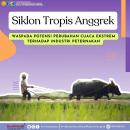What is toxoplasmosis and what causes it?
Toxoplasmosis (tox-ooh-plasmoe-sis) is a disease caused by a microscopic protozoal parasite called Toxoplasma gondii (tox-ooh-plasma gon-dee-eye). The organism has a complex life cycle. Toxoplasmosis occurs worldwide.
What animals get toxoplasmosis?
Many animal species can get toxoplasmosis. Cats are required for the life cycle of the organism. Infection is most common in cats, sheep, goats, and swine. Cattle seem to relatively resistant. Dogs can also be infected.
How can my animal get toxoplasmosis?
Toxoplasma gondii oocysts (eggs) are shed in the feces of infected cats. These eggs are then incidentally ingested (oral) by other animals, either through grazing or eating smaller mammals (e.g., when cats hunt small rodents). The protozoa can also be transmitted during pregnancy thereby infecting the unborn fetus.
How does toxoplasmosis affect my animal?
Most animals that have toxoplasmosis show no signs of illness. Disease is most often seen and the most severe in young animals, such as puppies or kittens. In adult animals, particularly sheep, the most commonly noted sign is abortion. Cats may have signs of pneumonia or damage to the nervous system or eyes. Affected dogs may show signs of encephalitis, such as seizures, head tilt, tremors, or paralysis.
Can I get toxoplasmosis?
Yes. People can get toxoplasmosis by ingesting (oral) Toxoplasma gondii from fecally contaminated (unwashed raw) vegetables or under cooked meat. It can also be spread by contact with feces from an infected cat. Disease is rare in people who are healthy. The greatest risk is to those with weakened immune systems (e..g., persons with HIV/AIDS or pregnant women). Symptoms begin with mild, flu-like signs (fever, body aches, headache, sore throat). Severe disease can occur if the protozoan invades the muscles, nervous system, heart, lungs or eye. The organism can cause abortion or birth defects in pregnant women. It can cause brain infection and death in persons with AIDS.
Who should I contact, if I suspect toxoplasmosis?
In Animals – Contact your veterinarian. In Humans – Contact your physician.
How can I protect my animal from toxoplasmosis?
Keep cats indoors to prevent them from becoming infected or from shedding oocysts into the environment. They should be especially kept out of livestock areas. Feed animals commercially prepared foods. Raw or under cooked meats should not be fed. Do not allow cat to hunt or eat wild rodents or birds.
How can I protect myself from toxoplasmosis?
The risk of infection can be reduced by proper food preparation. Meats should be thoroughly cooked. Good hygiene is also important. Wash fruits and vegetables before eating them. Avoid cross contamination of foods and utensils in the kitchen. Wash items that contact meat or meat juices in hot, soapy water. Wear gloves while gardening. Change the litter box daily. Always wash your hands after contact with any animal. Pregnant women and immunocompromised individuals should avoid cleaning cat litter if possible.










